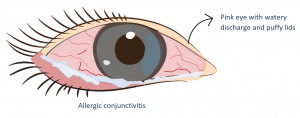Why do we blink?
Blinking is a normal response that shields the eye from dryness, glare or things coming towards it. Blinking also controls tears, which clean the outer surface of the eye, and can increase as a reaction to pain, bright light, changes in temperature and humidity.
How do I know if my child is blinking excessively?

If you think persistent or excessive blinking is troubling your child, you may need to consult an ophthalmologist who will assess and monitor your child’s vision, eye health and eye movements.
The eye doctor will perform a thorough exam to check if your child has any signs of:
- allergic conjunctivitis
- epiblepharon (in turned eyelashes)
- refractive error (need for glasses)
- intermittent exotropia (strabismus or squint)
- corneal abrasion (scratch on the front surface of the eye)
- conjunctivitis (pink eye)
- foreign body in the eye
If there are no signs of the above, the excessive blinking would be related to stress or habitual tics.
After the assessment, your child’s paediatric ophthalmologist will advise you on how to manage the cause of your child’s excessive blinking, depending upon the actual cause.
Eye drops, or ointment may be prescribed if an abrasion or conjunctivitis is diagnosed. Additionally, glasses may be prescribed if the excessive blinking is caused by blurry vision.
What causes excessive blinking in children?
Allergies
Your child may experience signs and symptoms of red, itchy or swollen eyes with frequent eye rubbing, and he/she might blink more often to ease the itchiness. Sometimes, allergies can be associated with nasal congestion or a runny nose.
You may want to check if your child is sensitive to dust or other triggers with an allergy test. (Read our article on allergic conjunctivitis for more information.)
Epiblepharon / Ingrown eyelashes (trichiasis)

Children with epiblepharon tend to blink due to the inward-turned eyelashes irritating the eye.
In less severe cases, lubricants can be used or the offending lashes epilated. For more severe epiblepharon, surgery may be required to reduce the in-turning of lids and lashes.
Refractive Errors
Your child may be blinking a lot because he/she cannot see clearly. Common refractive errors are:
- Myopia
- Hyperopia
- Astigmatism
Intermittent exotropia (Turning out of the eye)
Intermittent exotropia is a very common form of strabismus. Strabismus is a condition where there is misalignment of the eyes. (Read our article on strabismus for more information.)
Stress
Your child may be experiencing anxiety and fear which can be manifested in frequent eye blinking.
Habitual tics
Tics are caused by fast and repetitive muscle movements which lead to hard blinking. These may be caused by stress, fatigue or boredom. Most times it will get better without treatment, usually within weeks or months, sometimes recurring in between episodes.
Rarely is there a neurological cause, and brain scans are not necessary. It is best for parents to not draw attention or discuss the excessive blinking with their child. Discussion with the child’s paediatrician may be helpful in identifying ways to manage stress, anxiety or other possible triggers.

